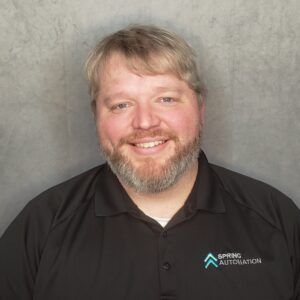
People always ask me, “What’s your degree in?” And my response is typically, “Which one?” Like many others my age, I spent my first four years of my liberal arts education undecided. In fact, I spent most of my twenties indecisive. It’s a trait that is by and large frowned upon. After my snarky response, if that individual inquires further, I then explain my first Bachelor of Science is in Psychology. Although I am currently advancing my career that sprung from my Bachelor of Science in Engineering, the looks at this point are always enjoyable. “What in the world do Psychology and Engineering have in common?” The commonality of my two degrees is irrelevant. Sure, I can make out the correlations, but really, those degrees are documented proof that I cannot make up my mind. However, instead of indecisive, I prefer the label of “Jack of all Trades.” After all, isn’t that what makes great engineers?
I made a pit-stop studying History and becoming a teacher. I completed my first practicum at a middle school and quickly discovered my love for history and teaching didn’t go together for me. Following graduation, I became an In-Home Family Counselor. The title sounds rather important, but I was essentially a case worker along with other social work majors. I helped develop treatment plans that parents and guardians implemented to keep their at-risk youth out of trouble. For seven months I saw a multitude of things that caused me to mature quickly. Between barely being able to keep it together emotionally some days and getting married in month six of those seven, I decided to leave that job. Growing up with a solid family structure in the suburbs of Chicago where nothing happened, these seven months as a counselor gave me a completely new view of the world and how I perceived myself in it.
To be a good husband that provides, I worked several temporary jobs over the next couple years. My favorites were being a light technician and a waste water tech. With the former I got to hang lights on trusses, wire them up and then program shows per the director’s request (sounds like engineering). With the latter I spent mornings collecting waste water samples from around the city to then be tested in the afternoon to create data points that could be analyzed (sounds like engineering). I applied for a permanent position with the waste water facility and was turned down because I didn’t have the “correct degree.” It was a rather disappointing and dejecting moment.
Almost immediately after that moment, however, I was presented with an opportunity. Since my wife worked at the University where I had previously graduated from, I could take advantage of the spousal tuition discount and maybe get a degree I “can actually use.” But what do I want to do with my life? At 25, I found myself asking the same thing I did at 18. I knew I had a good heart, but counseling showed me I didn’t have the stomach for trying to fix social issues that plague our society. However, I was kind of good at math and my favorite jobs up to that point had some sort of hands-on technical aspect. It was so obvious, wasn’t it? It was plain as day the whole time.
In Engineering 101, the professor said, “Welcome to the major. The next four years will be challenging, but afterwards, you can go do whatever you’d like.” Music to my years. I chose Mechanical Engineering, but fast forward to the present and, SURPRISE, I’ve done nothing mechanical engineering related. It’s been all electrical as a Design Engineer and now a Controls Engineer. The degree was difficult to obtain while balancing a marriage, work, and a new baby. But now, I had something that said I was not only good at math, but that I can probably figure out any problem that faces me or my team. That’s the magic of being an Engineer. You don’t get pigeon-holed into a singular career path. Not only are there endless engineering disciplines to choose from but I don’t have to stay technical. Engineering also opens the door to managing projects or managing people (Psychology actually helps here).
This article has been very self-focused because it’s super easy to talk about yourself, but my hope is that this is viewed as a sales pitch for being an Engineer. Career opportunities are limitless, and the demand is high. It seems that companies are always hiring, and recruiters are trying to be your LinkedIn friend every five seconds. Now there is one catch, and it’s the same with almost any career choice: You can earn the degree, but experience gives you a story to tell.
Allow me to once again indulge into my story, but I learned this quick, fresh out of graduation. I was all in with the finding the perfect first job. I researched almost 100 companies, sent introductory letters followed by another letter with my resume informing when they could expect a call from me. I called and spoke with managers, directors, VPs, and presidents selling who I was and requested an in-person interview whether they were hiring or not. I got several interviews that way but got only one job offer. It was with a small startup company, and all I got were verbal commitments. Nothing was in writing (don’t do that by the way). So, I moved my family to Nashville, showed up the first day to start and discovered the President who hired me was ousted and that I no longer had a job offer.
I found myself without a Job, my wife and I were expecting baby number two and we were living with my father-in-law. I had the right degree, I knew I could be anything and the “Mechanical” part of my degree was not a hinderance because the “Engineer” part is what mattered. I pulled together all the humility I could muster and went back to the temp agency I worked with before my Engineering degree because I still needed to put bread on the table. My only request to the agent was, “put me in a place with lots of engineers.” When you don’t have experience yet, it’s all about creating a network (not to date me but this was before LinkedIn did a lot of this for you). The agent got me a job where I would braze and weld since no “office jobs” were available. I talked to anyone who had engineer in their title while I was there. After only two months, a Design Engineer position opened, and I was hired rather quickly.
Side note: it’s important to remember to make the most out of the day that’s given to you. Since I have kids, we watch a lot of family animation movies. In Kung Fu Panda, Oogway tells Po, “Yesterday is history, tomorrow is a mystery, but today is a gift. That is why it is called the "present.” Course this saying doesn’t originate in this movie but it’s still great. “Carpe Diem” is also popular. Matthew 6:34 says, “Therefore do not worry about tomorrow, for tomorrow will worry about itself. Each day has enough trouble of its own.” When I found myself with a degree and no job, I couldn’t worry about if I would ever be an Engineer. I just needed to walk into that temp agency office and ask a simple question, “What’d ya got for me?”
I now work as a Controls Engineer with Spring Automation. Working at Spring is considered a career change when compared to what I was doing, but I decided I wanted to get involved with PLCs, HMIs, and integration. It seemed cool, seemed fun, and offered new challenges. I made this change with little impact to my overall career because I still had that key word in my title; “Engineer,” the profession that’s the “Jack of all Trades.” When I meet other engineers, I love to ask what they did before being an engineer. It is rarely someone who went straight into it from high school. These engineers I meet were once construction workers, farmers, mechanics and family counselors. Nothing is wrong with those professions, it’s just engineering caters to the one who always wants a challenge or changing environment, who might have a little A.D.D. or who might be indecisive. Problem solving skills help too. Other professions offer these caterings as well, but Engineering is more fun than work. Trust me, I’m an Engineering Psychologist.
Tim VanCleave - Controls Engineer
Tim joined Spring in 2016 and has led projects for multiple parcel customers. Over the course of a project, he has completed engineering work such as design, programming, and system start-up while also overseeing electrical installers and procurement.
Prior to Spring, he worked for Chromalox designing heater control panels. He served as a design engineer where he designed relay and PLC control panels, wrote stepper PLC programs and oversaw the panel builds.

